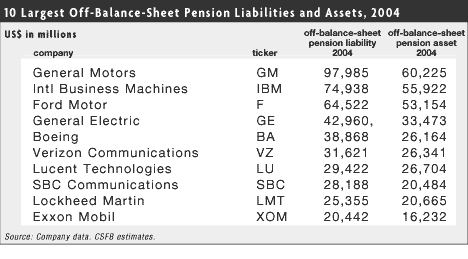US pension accounting
shift ewould hit equitiesf
By Deborah
Brewster in New York
Published: November 20 2005 21:28 | Last
updated: November 20 2005 21:28, Financial Times
Proposed changes to pension fund accounting in the US
are likely to prompt a shift of investment away from equities and
into bonds while speeding the demise of defined-benefit plans,
according to investment experts.
The accounting changes under consideration by the Financial
Accounting Standards Board would require defined-benefit funds,
which hold about $4,000bn (?3,399bn ?2,336bn) in assets, to stop
gsmoothingh their returns and instead report actual returns each
year.
Fund managers argue that the changes will create volatility in
corporate earnings because companies would be required to include
their pension returns in their quarterly earnings statements.
gCompany earnings would [be] at the mercy of what the pension
fund can earn in the stock and bond markets,h said Alistair Lowe,
director of global asset allocation at State Street.
The changes face gvigorous oppositionh from the private sector,
according to Michael Moran, vice-president of portfolio strategy at
Goldman Sachs.gFor companies that still maintain large pension
plans, these changes could be enormous,h he said in a recent
report.
Mr Moran said the changes would have an impact on capital
markets, with investment flowing from equities to fixed income as
pensions tried to limit risk by matching their investments to their
long-term liabilities.
The asset allocation shift would lower returns, and funds would
seek to redress this by using more derivatives and alternative
investments such as hedge funds.
A report by the Committee on Investment of Employee Benefit
Assets has estimated that switching to gmark to marketh accounting
would result in $290bn in funds being shifted from equities to
bonds. Business lobbyists in Washington warn against attempts to
overhaul the current system.
Bruce Josten, executive vice-president at the US Chamber of
Commerce, said the debate could turn into ganother propellanth for
non-union companies to move away from voluntary private pension
plans, by forcing them to move too much capital to fund their
pensions.
gIf we are going to force these companies in an intensely
competitive global environment, where many new competitors donft
have these legacy costs, [to put huge amounts of capital into
pensions] . . . they are going to find a way out of that process,h
Mr Josten said.
Lynn Dudley, vice-president of retirement policy at the American
Benefits Council, said she was concerned that FASBfs singular focus
on accounting rules might cause bigger pension policy issues to be
ignored. gA mark to market substitution doesnft make a lot of sense
for a country that is relatively dependent [on the private sector]
paying $120bn a year in benefits,h said Ms Dudley gWefre hopeful
that the business community will weigh in on FASB. It is not going
to be done in a vacuum.h
Mr Moran said the changes would hasten the decline of
defined-benefit plans. gMany companies will freeze their plans. Some
companies canft get rid of them ? GM, Ford, the Baby Bells ? but
many more will freeze their plans if they can.h Instead, workers
will be shifted to defined-contribution plans.
Two-thirds of the companies in the Standard & Poorfs 500
index still have defined-benefit plans, although many have already
been frozen.
State and government pension funds, widely believed to be in
worse shape than private funds, are unaffected by the changes.
Government accounting standards often follow FASB but in this
case the proposed changes might be unpalatable to politicians, who
would have to put more money into state pension funds
immediately.
Matt Scanlon, head of Americas institutional business at
Barclays, said some states were already proposing to shift to a
defined-contribution system as a way of staving off crisis.

Additional reporting by Stephanie Kirchgaessner in Washington.
|